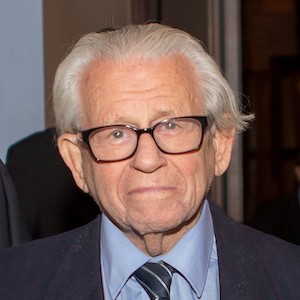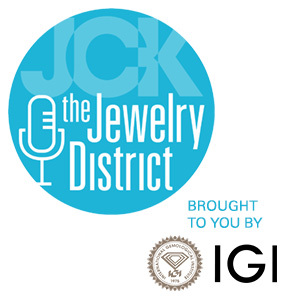
William “Willie” Nagel (pictured), the attorney-turned–De Beers rough broker known for his fierce advocacy on behalf of clients and his extensive network both in and outside the industry, died on July 14. He was 96.
According to a 2018 profile in The Daily Telegraph, Nagel was born in 1925, in Czernowitz, which was then part of Romania. When Nagel’s father heard the Romanian king on the radio assure citizens they were safe, with Hitler on one side and Stalin on the other, he picked up the family and moved to what was then called Palestine. There, his father worked in a bunch of industries, including diamonds. Nagel later found out that his father helped smuggled hundreds of Jews out of Hitler’s clutches.
“When he died, tens of people came to say how they thanked him for saving their lives,” Nagel told The Telegraph. “He was so modest, unlike me.”
Nagel went to study law in London but soon realized he wasn’t cut out to be a lawyer. “I could not rely on my accent being appreciated in a court of law, despite numerous elocution lessons,” he told Idex in 2008.
He was immediately drawn to diamonds, particularly the hustle and bustle of the Hatton Garden diamond district, close to the courts. He quickly made a name for himself there.
“People in Israel who worked in the business came to London to see their broker and to see De Beers,” he told The Telegraph. “Most of them couldn’t speak English. They used me to go to De Beers—that way I got to know the whole hierarchy of the company.”
In 1959, he formalized this arrangement by opening W. Nagel Ltd., which became part of the elite group of De Beers rough brokers that represented sightholders in front of what then called “the Syndicate.”
Nagel saw his role as acting as his clients’ “political lobbyist, advisor, confidante, and sometimes even psychologist,” he told World Diamond Magazine in 2016. “I have even found myself, believe it or not, mediating in marital affairs. Fortunately, not too often.”
He extended this diplomacy to the political world as well, rubbing shoulders with luminaries on all sides of the aisle. He told The Telegraph he had met every British prime minister and U.S. president since the 1960s; his walls were dotted with pictures of him with such notables as Queen Elizabeth, Princess Diana, and Margaret Thatcher.
In later years, he was considered one of the founding fathers of the Kimberley Process (KP). No doubt Nagel’s ties to U.K. politicians like Peter Hain—then Britain’s foreign minister for Africa—helped convince governments that the KP could solve the then-vexing issue of conflict diamonds. He remained proud of his involvement in bringing the KP into existence.
Two of his children, Toni and Adam, now work for his family firm. Even in his 90s, Nagel remained involved and alert; in 2017, when a tiff with a client spun into a full-blown lawsuit, the judge’s decision praised him as a “measured and articulate witness who showed no signs of diminishing acuity at the age of 92.”
The Jewish Chronicle probably summed up his personality best when it wrote that he was “brusque, dismissive, friendly, and charming—sometimes all at the same time—and certainly never short of chutzpah.”
De Beers said in a statement: “Willie played a central role in the evolution of the diamond industry over a very long and distinguished career. Although the industry will miss him, his legacy will live on just like the diamonds he was synonymous with.”
Willie Nagel is survived by his wife, Josephine; his children Mela, Toni, Joanna, and Adam; and his grandchildren George, Joseph, Ash, and Bo.
(Photo courtesy of De Beers Group)
- Subscribe to the JCK News Daily
- Subscribe to the JCK Special Report
- Follow JCK on Instagram: @jckmagazine
- Follow JCK on X: @jckmagazine
- Follow JCK on Facebook: @jckmagazine





